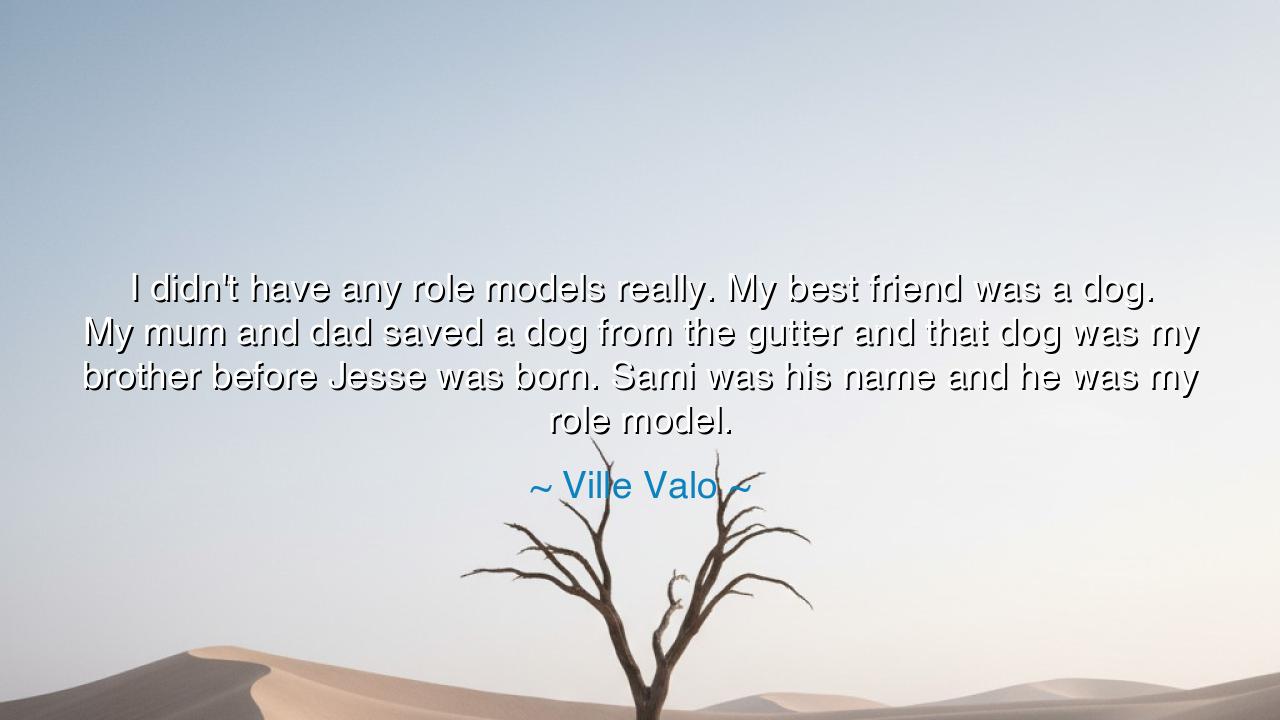
I didn't have any role models really. My best friend was a dog.
I didn't have any role models really. My best friend was a dog. My mum and dad saved a dog from the gutter and that dog was my brother before Jesse was born. Sami was his name and he was my role model.






In the tender and haunting words of Ville Valo, there breathes a truth both humble and profound: “I didn’t have any role models really. My best friend was a dog. My mum and dad saved a dog from the gutter and that dog was my brother before Jesse was born. Sami was his name and he was my role model.” These words, born not of grandeur but of gentleness, speak to a form of love older than speech and purer than pride. For in the eyes of that dog, Ville found what many search a lifetime to see—the reflection of loyalty, patience, and unconditional affection. And in that reflection, he discovered the essence of what it means to live with heart.
The origin of this quote lies not in philosophy, but in memory—in the early years of the Finnish musician’s life, long before fame or acclaim. As a child without human idols to follow, he found his guidance in the quiet companionship of Sami, a creature once discarded by the world. Rescued by his parents, Sami became not merely a pet, but a teacher in fur and silence. Where people spoke of ambition and achievement, the dog spoke through presence—through the steady faith of one who expects nothing yet gives everything. Thus, Ville’s role model was not a man of wealth or fame, but a creature of loyalty and grace, whose example taught him what no lecture could: the power of simple goodness.
The ancients themselves understood that wisdom often wears humble forms. The philosopher Diogenes, who lived in poverty and mocked the vanity of men, was said to have walked the streets with his dog, calling it his companion and philosopher. He observed that animals lived closer to nature and truth than those who sought honor or wealth. “Man,” he said, “has complicated what was once simple.” Ville Valo’s words echo that same reverence—for the innocence of the creature, the purity that remains untouched by the corruption of pride. The dog, in its quiet constancy, becomes a living parable of how one should love and live: without judgment, without envy, and without fear.
Consider also the tale of Greyfriars Bobby, the small terrier of Edinburgh who guarded his master’s grave for fourteen years. Through storm and hunger, the little dog kept his watch, refusing to leave the one he loved even in death. Such devotion moved an entire city, and his likeness stands immortal in bronze to this day. That story, like Ville’s memory, reminds us that the noblest virtues—loyalty, faithfulness, love without condition—are not bound to the human race. The dog, humble among creatures, embodies what philosophers call virtue and poets call grace.
Ville’s words also carry within them a quiet lament, for he speaks as one who grew up without human role models, without the guiding examples that shape the heart of a child. Yet what could have been emptiness was filled with warmth. The dog from the gutter, once abandoned, became his brother in spirit, teaching through presence what the world too often forgets—that love is not a matter of status, but of soul. In this, there is a strange kind of beauty: that the forsaken creature and the lonely child found salvation in each other. Together they became whole.
The meaning of this saying, then, is not about dogs alone—it is about the nature of virtue itself. Greatness does not always come robed in glory; wisdom does not always speak in words. Sometimes it sits quietly beside you, content to share your silence. To look into the eyes of a creature that depends on you and yet gives you unconditional trust is to glimpse the divine pattern that underlies all life: the law of reciprocal care, of compassion that transcends difference. To learn from such a teacher is to walk in truth more deeply than any sermon could teach.
The lesson, therefore, is both simple and eternal: seek your teachers not only among the mighty, but among the meek. Let your role models be not only those who speak of greatness, but those who practice kindness without reward. If you are lonely, look not upward for heroes, but outward for love—for sometimes your greatest lesson will come from the smallest heart. Practice loyalty as the dog does, love without calculation, forgive without memory, and stand by those who are broken. In doing so, you will honor both your own humanity and the quiet wisdom of the creatures who have been our companions since time began.
So, my listener, take the teaching of Ville Valo to heart. Do not scorn humble beginnings, nor overlook the simple souls who walk beside you. In every act of devotion, in every creature that loves you without reason, there is a spark of divine truth. The wise man listens not to words alone, but to the language of loyalty, of gentleness, of unspoken care. For the heart that can learn from a dog rescued from the gutter is the heart that has found what the ancients called virtus—the nobility of the spirit that shines without pride.






AAdministratorAdministrator
Welcome, honored guests. Please leave a comment, we will respond soon